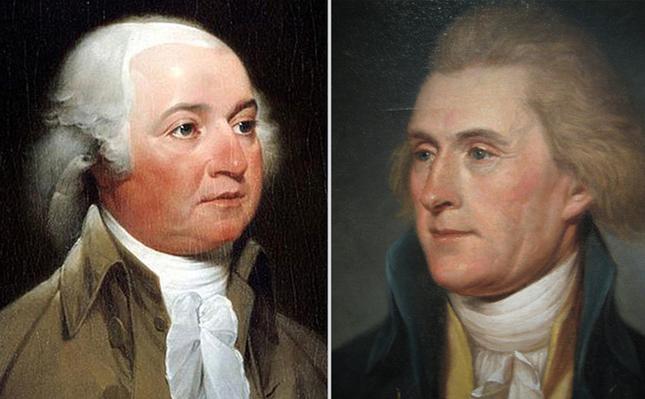Adams & Jefferson, July 4, 1826
By • July 18, 2013 0 3168

It seems nearly impossible to suppose that two of the Founding Fathers and ex-presidents could have both died on the Fourth of July, exactly 50 years after their signing of the Declaration of Independence. But, that’s just what happened. John Adams and Thomas Jefferson, who made history on so many levels, forged a great friendship when they worked together during the drafting of the Declaration. Jefferson, Adams and his wife Abigail, were neighbors and confidants in Paris right after our revolution and at the beginning of the French Revolution. But, the two men were very different personalities, and their political views on how to run the country and deal with foreign affairs grew further and further apart during the 25 years between 1775 and 1800, when their rivalry and resulting animosities grew with Jefferson pursuing a more liberal stance with his Republican Party and Adams taking over leadership of the more conservative Federalist Party.
The rift became complete when Jefferson defeated Adams in a very bitter and tight presidential race in 1800, which many historians believe to have been the worst time in American history for extreme partisan politics in Washington.
Adams retired to his family home in Massachusetts, and the two men, who had exchanged hundreds of letters and hours of conversation over the years, literally stopped talking to each other for the next ten years.
A mutual friend, Dr. Benjamin Rush, also a fellow signer of the Declaration, was pained by the animosity between the two men which had lasted so long.
He said he had a dream about Jefferson and Adams and woke feeling that he had to intervene. So, he wrote to each and brokered peace between them, asking them to forget and forgive and remember their former friendship which had carried them through such turbulent times. That broke the ice and the two men resumed a remarkable epistolary friendship. Although they disagreed on many topics, their admiration for each other allowed them to discuss their differences without losing the friendship.
Shortly after the rapprochement, Benjamin Rush died and both Jefferson and Adams expressed their gratitude to Rush for bringing them together again. They continued to correspond for the next 15 years.
When the government decided to have a huge 50-year celebration of the signing of the Declaration in Washington, the two men were invited to speak at the anniversary.
But, it was not to happen, because by the time summer came, they were both too weak and sick to make the trip.
As the anniversary approached in Washington, D.C., Adams in Quincy, Mass., and Jefferson at Monticello in Virginia were both critically ill. On the morning of July 3, Jefferson woke up long enough to ask what day it was. When he found out it was only the 3rd, he managed to hang on until 1 p.m. of July 4th, when he breathed his last. Adams, in his sickbed in Quincy, Mass., would not have known that Jefferson had just died, and his last words were “Jefferson survives,” even though Jefferson had already died five hours earlier.
But it must have been a great consolation for Adams to die knowing that, 50 years after he helped to change the world, his own son, John Quincy Adams, was President of the United States.
Donna Evers, devers@eversco.com is the owner and broker of Evers & Co. Real Estate, the largest woman owned and run real estate firm in the Washington metro area; she is also the proprietor of Twin oaks Tavern Winery in Bluemont, Virginia, and a devoted student of Washington area history.

